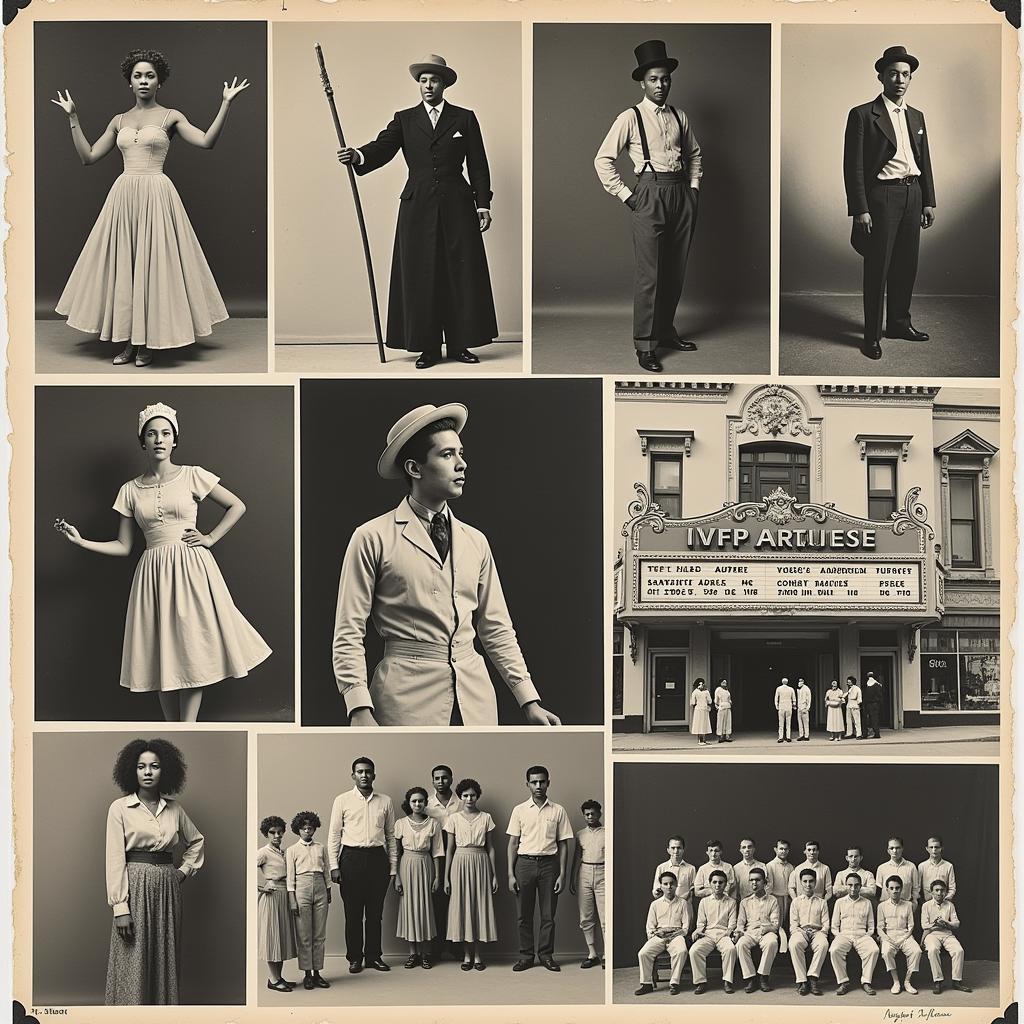Exploring the Rich Tapestry of African American Drama Companies
African American drama companies have played a crucial role in shaping American theater and reflecting the African American experience. From their early beginnings facing segregation and discrimination to their contemporary presence on Broadway and beyond, these companies have provided a platform for Black voices and stories to be heard. They have nurtured talent, challenged societal norms, and enriched the cultural landscape. Let’s delve into the fascinating history and vibrant present of these important artistic institutions.
 Historical Photos of African American Drama Companies
Historical Photos of African American Drama Companies
A Legacy of Resilience: Early African American Drama Companies
The journey of African American drama companies began in the face of adversity. In the late 19th and early 20th centuries, racial segregation and prejudice limited opportunities for Black artists. Determined to tell their own stories and create spaces for their artistic expression, African Americans formed their own theater companies. These early companies, often operating with limited resources, became vital community hubs, fostering a sense of pride and cultural identity. They developed innovative performance styles, drawing from African traditions, vaudeville, and other influences, and laid the groundwork for future generations of Black playwrights, actors, and directors.
Did you know that many early African American theaters also served as social and political gathering places? They became centers for community activism and discussions on civil rights, reflecting the powerful intersection of art and social change. Check out some of the exciting African American theater in african american theater los angeles.
The Rise of Prominent African American Drama Companies
The mid-20th century witnessed the emergence of several influential African American drama companies that significantly impacted American theater. Companies like the Negro Ensemble Company and the Black Arts Repertory Theatre/School challenged conventional theatrical norms and pushed boundaries with their productions. They championed new Black playwrights, giving voice to a generation grappling with the Civil Rights Movement and the ongoing struggle for equality. These companies nurtured talent that would go on to shape the landscape of American theater and film.
“African American drama companies have always been at the forefront of pushing artistic boundaries,” says Dr. Anika Johnson, Professor of Theatre Arts at Howard University. “They have consistently used their art to challenge the status quo, inspire dialogue, and reflect the complexities of the African American experience.”
African American Drama Companies in the 21st Century
African American drama companies continue to thrive in the 21st century, showcasing the evolving narratives and experiences of Black communities. They tackle contemporary issues, explore diverse theatrical styles, and continue to develop new talent. From established companies to emerging collectives, they represent a vibrant and vital part of the American theatrical landscape. They have also expanded their reach through digital platforms and community engagement initiatives, making their work accessible to wider audiences. You can also explore African American theater in the african american theater bay area.
What are some of the challenges faced by African American drama companies today?
While these companies have made significant strides, they continue to face challenges related to funding, representation, and access. Securing sustainable funding remains a constant struggle, impacting their ability to produce ambitious work and support emerging artists. Ensuring equitable representation both on and off stage is also a key priority, as is broadening access to their productions for diverse communities.
How can audiences support African American drama companies?
Audiences play a vital role in supporting these companies by attending performances, donating, and spreading awareness about their work. Engaging in conversations about the plays and their themes can also help amplify their impact.
“The future of African American theater rests on the continued support and engagement of audiences,” notes renowned playwright and director, Marcus Thompson. “By embracing these stories and celebrating these artists, we contribute to the rich tapestry of American culture.” If you’re interested in exploring early African American cinema, check out african american movies 1920s.
Conclusion: Celebrating the Enduring Power of African American Drama Companies
African American drama companies have played a pivotal role in shaping American theater, reflecting the diverse and evolving narratives of the African American experience. From their resilient beginnings to their vibrant presence today, they have empowered Black voices, challenged societal norms, and enriched our cultural landscape. By continuing to support and celebrate these important artistic institutions, we ensure the future of this powerful and vital art form. You might also be interested in reading about african american car pioneers.
FAQ
- What is the significance of African American drama companies?
- How did segregation impact the development of Black theater?
- Who are some prominent figures in African American drama?
- Where can I find information about current African American theater productions?
- How can I support African American drama companies in my community?
- What are some of the key themes explored in African American drama?
- What is the role of African American drama in promoting social justice?
Common Scenarios and Questions
-
Scenario: You want to learn more about the history of African American theater in your city.
-
Question: Where can I find resources on local African American theater history?
-
Scenario: You’re a student researching African American playwrights.
-
Question: Are there any online databases or archives of African American plays?
-
Scenario: You’re interested in attending a performance by an African American Drama Company.
-
Question: Where can I find listings of upcoming productions?
Further Exploration
Explore related articles on our website about African culture and history. You can also learn more about breathtaking scenery with african falls top view.
Call to Action
For assistance, please contact us: Phone: +255768904061, Email: [email protected], or visit us at: Mbarali DC Mawindi, Kangaga, Tanzania. We have a 24/7 customer service team.
